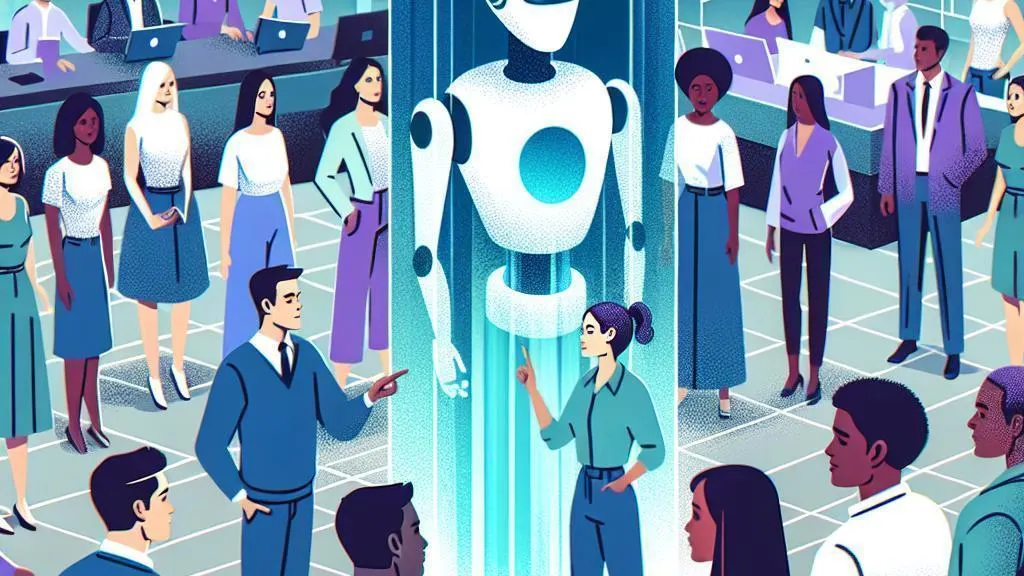The Hype vs. Reality of AI: Examining ChatGPT, Claude, and Gemini's Popularity and Impact
Unless you've lived under a rock, you've undoubtedly heard all the excitement and hype surrounding …

In the digital world, where trends are evolving at the speed of light, it's essential to keep ourselves grounded with the fundamentals.
One such fundamental is Artificial Intelligence or AI – a tech marvel that is drastically transforming the ways we conduct businesses in today's ever-evolving digital market.
The term AI might sound fancy, tech-centric, and somewhat intimidating to some of us. It can further baffle the uninitiated, leaving them scratching their heads over questions like "What does AI have to do with my business?" or "How can I apply AI to digital marketing, content creation, or SEO?"
Strapping in and holding on tight, we're about to embark on a thrilling ride untangling the webs of AI! This blog post aims to present a clear, comprehensive, and easily digestible understanding of AI – poking and prodding how it can be leveraged for content creation, impacting SEO, website traffic, and empowering small businesses, marketing managers, and digital marketers.
Ready to pull back the curtain and illuminate this tech puzzle? Strap in, let's dive in!
In raw terms, AI mirrors human intelligence in machines designed to think like people – understand language, solve problems, and learn new information.
These machines are particularly equipped to accomplish a specific set of tasks or even a broad range of activities that human intelligence can accomplish.
A common analogy to explain AI is of a garden hose. If you were to automate the watering of your plants using a garden hose, it would be an intelligent use of the hose.
However, if the hose was to analyze the conditions, identify plants that need watering, adjust the water temperature to avoid harming the plants and know when to stop, that would be artificial intelligence.
The foundation of AI goes deep into specialized hardware and software meant for writing and training machine learning algorithms. These algorithms learn from extensive amounts of data, identify patterns, and apply these insights to predict future outcomes.
AI extends to interpreting language, recognizing speech patterns, projecting visions, and understanding expert systems. Python, R, Java, C++, and Julia are a few programming languages popular among AI developers.
AI signifies the simulation of human intelligence by machines and can include anything from Google's search algorithms to IBM's Watson. Machine learning, a subset of AI, allows software applications to predict outcomes without needing to be explicitly programmed, using historical data inputs.
In comparison, deep learning, a subset of machine learning, structures algorithms in layers to form an 'artificial neural network’ that can learn and make intelligent decisions independently.
Think about self-driving cars or ChatGPT, and you’ll understand the extent to which deep learning has permeated our lives.
Used effectively, AI can automate tasks typically performed by humans, including customer service, fraud detection, quality control, and even lead generation.
The sheer volume of data that AI can process allows for broader insights into business operations, paving the way for strategic decision-making.
Moreover, these predictive capabilities lend a competitive edge, making AI pivotal for many of today’s biggest companies including Google, Microsoft, and Apple.
AI has led to customers connecting with taxis, has revolutionised search engines, and has uniquely structured neural network systems which have caused breakthroughs in natural language processing.
However, the adoption of AI isn’t without its pitfalls. While AI's power lies in processing large amounts of data rapidly and making more accurate predictions than humans, AI's processing capacity could be expensive.
Furthermore, it can inadvertently or intentionally lead to biased and discriminatory systems. It’s thus necessary for businesses to be alert to potential pitfalls and process AI’s outputs with discretion.
Each type opens up new avenues in the realm of AI, progressively enhancing its capabilities and impact on human interactions with technology. Broadly, AI is categorized into weak AI, which is programmed and manufactured for a particular set of tasks, and strong AI, designed to carry out any intellectual job a human being can.
Whether it's automating mundane tasks, predicting consumer behavior, enhancing operational efficacy, or generating content, AI stands as a game-changer for businesses big or small while being a useful tool even for individuals and professionals like content writers, marketing managers, and small business owners.
Now, we have established an understanding of what AI is, what it does, and how it can be used in your business or job. Moreover, we have implicitly addressed how AI can affect SEO and website traffic – primarily through content creation, prediction-based algorithms, and automation.
This could be the moment when you, as a marketing manager or business owner, ponder about the school of change that's waiting in the wings. Are digital marketers or content writers prepared for this? Are our educational institutions equipping the future workforce for this seismic shift?
We will explore these and more in the next part of this blog, where we will understand how educational institutions introduce AI to students and the general public, and the impact of AI on SEO, Website traffic, and businesses.
Keep in mind that while AI offers massive potential, it's a tool in the end, and your usage of it would ultimately decide its value for your business.
Whether you wish to jump on the AI bandwagon or take a more conservative approach is entirely up to you, but understanding and acknowledging AI's capabilities can give you a formidable edge, helping you stay ahead in the game through informed decisions.
Stay tuned for the next part where we'll delve further into AI's diverse applications, its potential pros/cons, ethical considerations, and the importance of AI governance and regulations.
As we unravel these aspects, we aim to enable you, our readers, to make the most of AI in your business, job roles, and general understanding of this revolutionary technology.
We've seen how it has become inseparable from our everyday life, squeezing into everything from process automation to natural language processing.
More importantly, we've understood AI's Herculean potential to supercharge businesses, especially for digital marketing and content creation.
Equipped with this fresh knowledge, the big question now ringing in your ears may not be "What is AI?" but rather "How do I make the most out of AI?" For the answers, stay tuned for the sequel to this exciting odyssey.
In our next installment, we're poised to delve deeper into how AI is shaking up the digital marketing field, SEO, and website traffic. We'll further explore the touchpoints of AI education and draw the curtain on this powerful tool's impact on your business or job role.
We understand AI can feel like a towering mountain to scale, especially when grappling with its implications for your business.
Rest assured, with a firm understanding in your pocket and another insightful read in the pipeline, you're better equipped than ever before to unleash AI's potential for your business. So folks, hang tight as we unravel Artificial Intelligence even further in the next chapter!
Some other posts you may like

The Hype vs. Reality of AI: Examining ChatGPT, Claude, and Gemini's Popularity and Impact
Unless you've lived under a rock, you've undoubtedly heard all the excitement and hype surrounding …
August 19, 2023
Read More
How can I use Google analytics to find new content ideas?
Imagine wielding a tool that bends data into actionable insights, a compass that guides your …
August 19, 2023
Read More